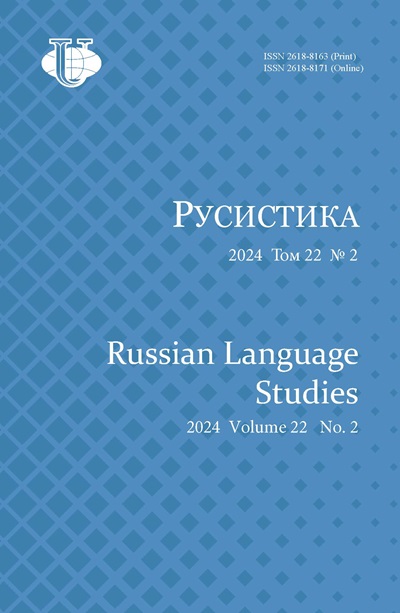Issue
Title
Authors
|
Makarova V. |
|
Bozhenkova N.A., Negushina A.A., Bozhenkova R.K. |
|
Strelchuk E.N., Ilikhamu S. |
|
Moskvitcheva S.A., Aleksandrova O.I., Bruffaerts N.S. |
|
Marinova E.V. |
|
Pencheva A. |
|
Reagan T.G. |
|
Chirsheva G.N. |
|
Bozhenkova N.A., Rubleva E.V., Baharloo H. |
|
Yan K. |
|
Ivanov E.E. |
|
Ageeva A.V., Abdullin L.R., Gabdreeva N.V. |
|
Merkulova I.A., Protsenko E.A. |
|
Denisenko V.N., Safaralieva L.A., Perfilyeva N.V. |
|
Shulezhkova S.G. |
|
Dolzhikova A.V. |
|
Tskhovrebov A.S., Shamonina G.N. |
|
Kovrizhkina D.G., Moskovkin L.V. |
|
Meng L., Kurjanovich A.V., Cao R. |
|
Sysoyev P.V., Filatov E.M. |
|
Azimov E.G., Kulibina N.V., Van V. |
|
Zhapparkulova K.N., Tuyembayev Z.K., Dzholdasbekova B.U. |
|
Mikova S.S., Kataeva I.V., Ndyay M. |
|
Likhachev S.V., Popova E.I. |
|
Gorozhankina T.N., Grechukhina V.V. |
|
Zavjalova O.S., Phan N.S. |
|
Li Y. |
|
Zhakupova A.D., Anichshenko O.A., Temirova Z.G. |
|
Nikitina T.G., Rogaleva E.I. |
|
Mamontov A.S., Boguslavskaya V.V., Ratnikova A.G. |
|
Lebedeva M.Y., Wu D. |
|
Dzhusupov M. |
|
Zhelezniakova E.A. |
|
Filippova O.V., Ariskina O.L. |
|
Pugachev I.A., Iarkina L.P., Din T.T. |
|
Mokienko V.M. |
|
Dubinina N.A., Ptiushkin D.V. |
|
Lapteva M.L., Firsova M.A. |
|
Shmelkova V.V., Makarova Y.V. |
|
Vasilieva G.M., Chepinskaya M.A., Wang J. |
|
Leontyeva T.V., Shchetinina A.V. |
|
Bobrova M.V. |
|
Dziuba E.V. |
|
Marinova E.V. |
|
Kallistratidis E.V., Ilyasova S.V. |
|
Novospasskaya N.V., Dugalich N.M. |
|
Diadechko L.P., Wang B. |
|
Sotova I.A., Kvashnina D.S. |
|
Khamraeva E.A., Kytina N.I., Bolmazova E.V. |
|
Valentinova O.I., Rybakov M.A., Ekshembeeva L.V. |
|
Muhammad L.P., Ippolitova L.V., Zhang S. |
|
Sarycheva M.R., Derybina S.A. |
|
Denisenko A.V., Bereznyatskaya M.A., Kalinina J.M. |
|
Kozhevnikova M.N., Khamraeva E.A., Kytina V.V. |
|
Nikitina T.G., Rogaleva E.I. |
|
Ivanova M.V., Klushina N.I. |
|
Zdorikova Y.N., Abyzov A.A., Makarova E.N. |
|
Qiu X. |
|
Mirchevska-Bosheva B., Medvedeva N.V. |
|
Terkulov V.I. |
|
Farysenkova L.V., Zhellali E.I. |
|
Vikhrova A.Y., Lypkan T.V. |
|
Dorofeev Y.V., Zhuravleva E.A. |
|
Chudinov A.P., Segal N.A. |
|
Vorkachev S.G. |
|
Kozhevnikova E.V., Vyazovskaya V.V., Trubchaninova M.E. |
|
Arynbayeva R.A., Makhanova Z.K., Dmitryuk N.V. |
|
Pivovar Y.S. |
|
Nedosugova A.B. |
|
Laposhina A.N., Lebedeva M.Y. |
|
Markova E.M., Kvapil R. |
|
Makarova V., Terekhova N. |
|
Vokhmina L.L., Klobukova L.P. |
|
Kopnina G.A., Koshkarova N.N., Skovorodnikov A.P. |
|
Baranova I.I. |
|
Vodopianova K.M. |
|
Martiryan N.I. |
|
Zagidullina M.V., Kiklewicz A.K. |
|
Zagorovskaya O.V., Biryukova E.D. |
|
Drozdova O.E. |
|
Pashkovskaya S.S. |
|
Dmitriyeva N.M., Prosvirkina I.I. |
|
Lumpova L.N., Ryzhova N.V. |
|
Hamsovszki S.A. |
|
Baranova I.I., Chuvaeva K.M. |
|
Licari C., Perotto M. |
|
Velichko A.V. |
|
Dyakova T.A., Khvorova L.E. |
|
Pashkovskaya S.S. |
|
Tolstaja A.L. |
|
Slozhenikina Y.V., Rastyagaev A.V. |
|
Isajeva E.S., Vasiljeva E.G. |
|
Soltys V.K. |
|
Guzhelya D.Y. |
|
Gasparian N.K. |
|
Ma Qing -. |
|
Hmira T. |
|
Shustikova T.V., Žurkina N.V. |
|
Bartosh J.V. |
|
Rozboudova L., Konecny J., Markova E.M. |











